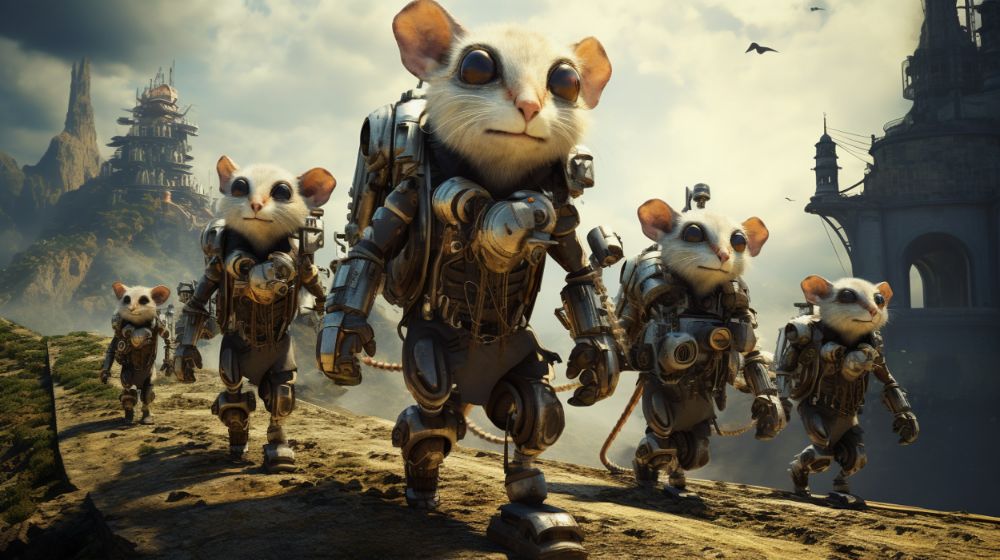The world of battle royale games has evolved significantly from niche modifications into a global phenomenon, integrating survival and shooter mechanics.
Prominent titles in this genre include Fortnite, Apex Legends, and PUBG, each offering distinct gameplay elements.
These games require players to employ intricate strategies and offer robust communities for engagement.
The future of this evolving genre may be influenced by advancements in AI and the increasing prevalence of cross-platform play, which could further reshape the gaming experience.
Key Takeaways
- Battle royale games evolved from survival and shooter games, influenced by films like “Battle Royale” and “The Hunger Games.”
- Key mechanics include resource gathering, a shrinking play area, and strategic combat, adding tension and unpredictability.
- Popular titles like “Fortnite,” “Apex Legends,” “Warzone,” and “PUBG” each offer unique features and gameplay experiences.
- Community interactions, feedback, and cultural activities play significant roles in shaping and enhancing the player experience.
- Future trends focus on immersive environments, advanced AI, cross-platform play, and AR/VR integration for more dynamic gameplay.
Origins of Battle Royale
Battle royale games evolved from a blend of various gaming genres and cultural influences. Their origins can be traced to survival games, shooter games, and the concept of last-man-standing in competitive sports. Films such as “Battle Royale” and “The Hunger Games” significantly influenced game designers by presenting high-stakes narratives where only one participant emerges victorious.
In the early 2000s, elements of the battle royale genre began to surface in mods for existing games. A notable example is “DayZ,” a mod for “ARMA 2” that introduced a player-versus-player survival experience. This mod served as a foundation and inspired the development of games like “PlayerUnknown’s Battlegrounds” (PUBG).
Brendan Greene, known as PlayerUnknown, played a crucial role in shaping the genre through his mods for “ARMA” and later with the release of PUBG in 2017.
Following the success of PUBG, other developers quickly adapted to include battle royale modes in their games. “Fortnite” is a prominent example, having incorporated a battle royale mode that capitalized on the growing trend.
What began as niche mods gradually developed into a global phenomenon, significantly impacting the gaming industry.
Key Game Mechanics
In examining the core mechanics of battle royale games, one observes a combination of survival, exploration, and combat elements that demand constant player engagement.
Initially, players face survival challenges. As the game advances, a contracting play area compels players to move closer together, thereby increasing the probability of encounters. Failure to remain within this safe zone results in taking damage, which can lead to elimination.
Exploration plays a significant role as well. Players must search the game environment for weapons, armor, and other resources. Each match begins with players starting from scratch, relying on their ability to quickly gather essential items. The random distribution of these items introduces unpredictability, ensuring variability in each game.
Combat is the area where player skills are rigorously tested. Engagements can occur at both long and short ranges, necessitating proficiency with various weapons and tactics. Effective combat requires quick reflexes and strategic thinking to outmaneuver opponents.
Furthermore, managing limited resources such as ammunition and health kits adds a strategic dimension to gameplay.
Popular Titles
In exploring popular battle royale titles, you’ll notice how standout game mechanics and player community dynamics shape the experience.
Games like Fortnite and Apex Legends offer unique features and foster vibrant communities.
Major franchise releases continuously push the boundaries, keeping the genre exciting and evolving.
Standout Game Mechanics
Battle royale games have become increasingly popular, but specific game mechanics distinguish certain titles from others.
“Fortnite,” for example, incorporates a building mechanic that allows players to construct defensive structures or gain high ground during combat. This feature introduces an additional strategic element, making encounters less predictable and more dynamic.
“Apex Legends” features a notable ping system that facilitates non-verbal communication. Players can mark enemies, loot, or locations without speaking, enhancing team coordination and accessibility for those who prefer not to use voice chat.
“Call of Duty: Warzone” includes the Gulag mechanic, where eliminated players have the opportunity to re-enter the game through a one-on-one combat scenario. This adds a layer of excitement and offers a potential second chance for players.
In “PUBG,” the focus on realistic ballistics and weapon handling sets it apart. Players must consider bullet drop and travel time, which adds complexity and rewards skill in long-range engagements.
These mechanics not only differentiate these games but also enhance the overall gameplay experience by offering unique strategies and challenges.
Player Community Dynamics
Beyond unique game mechanics, the player community dynamics in popular battle royale titles significantly shape the overall experience. In games like Fortnite, PUBG, or Apex Legends, players engage with a vast, global community, which contributes to the learning of new tactics and strategies and the formation of social connections.
Fortnite’s community, for example, is noted for its creativity and collaboration. Players can engage in forums, Discord channels, and social media groups where tips, tricks, and fan art are shared. These interactions foster a sense of belonging and enhance the immersive experience of the game.
PUBG’s community is often recognized for its focus on tactical depth and competitive spirit. Players frequently analyze gameplay mechanics and share in-depth strategies, which can help others improve their skills.
Apex Legends features a supportive and diverse player base. The game’s ping system facilitates communication and teamwork, making it easier for players to connect, whether they’re playing solo or as part of a squad.
Learn more in our article https://bet-of-the-day.net/2024/10/02/the-importance-of-team-dynamics-in-esports/
Major Franchise Releases
Major franchise releases in the battle royale genre have significantly impacted the gaming industry, setting new standards for gameplay and community engagement. Titles such as “Fortnite,” “PlayerUnknown’s Battlegrounds (PUBG),” and “Apex Legends” have each introduced unique mechanics and content that have shaped the genre.
“Fortnite” features a frequently updated world with seasonal events, maintaining player interest through continuous content changes. Its building mechanics introduce a strategic element that distinguishes it from other games in the genre.
“PUBG,” on the other hand, emphasizes a realistic and tactical approach, offering immersive environments and skill-based combat that appeal to players seeking a more grounded experience.
“Apex Legends” combines fast-paced action with hero-based abilities, providing a dynamic and fluid gameplay experience.
These games have extended their influence beyond the gaming industry into mainstream media, with characters appearing in various forms of entertainment and even fashion.
They’ve also set benchmarks for community involvement, with developers actively engaging with players and incorporating feedback into ongoing updates.
Strategies for Success
Achieving success in battle royale games necessitates a combination of strategic planning and quick reflexes. Initially, it’s advisable to drop into less populated areas. This approach allows players to gather weapons and supplies without engaging in immediate combat. Prioritizing the acquisition of a reliable weapon, shield, and health items is essential.
Monitoring the shrinking play zone is crucial. Players should consistently pay attention to the timer and map to ensure they remain within the safe area. Effective positioning is important; selecting high ground or areas with substantial cover can provide a tactical advantage over opponents.
Engagements should be deliberate and calculated. It isn’t always beneficial to engage every enemy encountered; evaluating the situation can prevent unnecessary loss of health and ammunition. Utilizing stealth and the element of surprise can confer significant advantages during confrontations.
In team-based modes, communication is a fundamental component. Sharing information regarding enemy locations, available loot, and tactical strategies can enhance team cohesion and effectiveness. Coordinated teamwork often determines the outcome of the game.
Community and Culture
Developing effective strategies and refining reflexes are crucial for success in battle royale games. However, the community and culture associated with these games also play a significant role. Interaction with other players through forums, live streams, and social media platforms can foster a sense of belonging and enhance one’s understanding of the game.
In-game events and updates often lead to active discussions, creating a dynamic environment that maintains player engagement. Sharing tips on platforms like Reddit, watching Twitch streams, or engaging in Discord chats can facilitate continuous learning and skill development. These interactions can also lead to the formation of lasting social connections.
The culture of battle royale games often extends beyond the digital realm. Activities such as cosplay, fan art, and community meet-ups highlight the creativity and enthusiasm of the fan base. Participation in these activities can offer a deeper appreciation of the game and its influence on popular culture.
Future Trends
The landscape of battle royale games is undergoing significant changes, driven by several emerging trends that are set to redefine the genre. Developers are increasingly focusing on creating more immersive and dynamic environments. This includes the implementation of real-time changing worlds with features such as weather systems and day-night cycles, which add strategic complexity and unpredictability to gameplay.
Another notable trend is the incorporation of advanced artificial intelligence (AI). In future battle royale games, opponents will include not only other players but also sophisticated AI enemies capable of adapting to player strategies. This development aims to make each match more challenging and engaging, requiring players to continuously adapt their tactics.
Cross-platform play is becoming a standard feature in the genre and is expected to improve further. This functionality allows players to compete with friends across different devices, including consoles, PCs, and mobile platforms, thereby fostering larger and more diverse player communities.
Additionally, there’s a growing interest in integrating augmented reality (AR) and virtual reality (VR) into battle royale games. These technologies have the potential to offer more immersive experiences by creating a sense of presence within the game world. Such advancements could change the way players interact with the game and each other.
Also, I recommend reading our article The Future of Esports
Conclusion
You’ve journeyed through the evolution of battle royale games, discovering their origins and unique mechanics. You’ve seen how key titles like Fortnite, Apex Legends, and PUBG shape the genre and learned strategies to enhance your gameplay. The community’s vibrant culture adds depth, making every match more than just a game. With future trends promising even more immersive experiences, you’re now equipped to plunge into this ever-evolving, adrenaline-pumping world. Ready to drop in?



